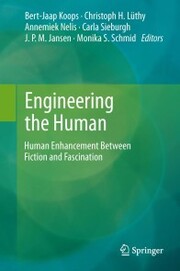The volume is collection of articles treating the topic of human improvement/enhancement from a variety of perspectives philosophical, literary, medical, genetic, sociological, legal etc. The chapters in this volume treat not only those aspects that most immediately come to mind when one thinks of human enhancement, such as genetic engineering, cloning, artificial implants and artificial intelligence etc. Somewhat less obvious aspects include evolutionary perspectives in connection with the prolongation of the human lifespan, plastic surgery since its beginnings, and questions such as whether the distinction between natural and artificial can really be drawn at all and how it has been conceived across the ages, or what the legal implications are of recent developments and techniques. Many papers make links to the representation of these developments in popular culture, from Jules Verne through Aldous Huxley to the movie Gattaca, address the hopes and fears that come with them as well as the question how realistic these are.While all chapters are written by scientists at the international top of their respective fields, all are accessible to a non-specialist audience and eminently readable. We believe that they represent a state-of-the art overview of questions that are of interest to a large audience.The book thus targets a non-specialist audience with an interest in philosophical, sociological, scientific and legal issues involved in both traditional and recent matters concerning the desire of mankind to improve itself, the human body, the human mind and the human condition. It is unique in that it brings together all these aspects within a coherent and cohesive collection.
Bert-Jaap Koops (1967) is professor of Regulation and Technology at Tilburg University and a member of The Young Academy. He studied Mathematics as well as General Literature at the University of Groningen, and obtained a PhD in Law at Tilburg University. He researches the relation between technology (ICT, bio-, nano-, and neurotechnology) and regulation issues, focusing on digital rights, digital crime, privacy, DNA forensics, and human enhancement. Christoph Lüthy (1964) teaches History of Science at Radboud University Nijmegen and is a member of The Young Academy. He studied Philosophy and Modern Linguistics at Oxford and Physics at Basel, and obtained his PhD in the History of Science at Harvard. His research focuses on the historical interaction between the natural sciences and philosophy. Annemiek Nelis (1970) is general director of the Centre for Society and Genomics at Radboud University Nijmegen. She studied Health Sciences in Maastricht and Bath and obtained her PhD in the Sociology of Science and Technology at the University of Twente. She researches the social aspects of genetics and genomics. In her research she mainly focuses on questions concerning citizenship, democracy, and expertise. Carla Sieburgh (1969) is professor of Civil Law at Radboud University Nijmegen and a member of The Young Academy. She studied Medicine and Law at the University of Groningen, served her medical internship in Amsterdam and Curaçao, and obtained her PhD in Law at the University of Groningen. She researches the principles of civil law and its relation to European law, fundamental rights, criminal law, administrative law, judicial construction, and conflicts between legal approaches and other fields, such as mathematical principles.
Towards Homo Manufactus? An Introduction to this Volume.- Historical and Philosophical Reflections on Natural, Enhanced and Artificial Men and Women.- Changing the Body Through the Centuries.- Human Enhancement in Future Explorations.- Genetic Enhancement of Human Beings: Reality or Fiction? Gullivers Next Travels: A Journey into the Land of Biomaterials and Synthetic Life.- Human Robots and Robotic Humans.- Human Enhancement, Evolution and Lifespan: Evolving Towards Immortality? Opting for Prevention: Human Enhancement and Genetic Testing.- A Unique Copy: The Life and Identity of Clones in Literary Fiction.- Parents Responsibility for Their Choices Regarding the Enhancement of Their Child.- Concerning Humans and Human Rights. Human Enhancement from the Perspective of Fundamental Rights.- Conclusion: The Debate About Human Enhancement.
„E-Book“ steht für digitales Buch. Um diese Art von Büchern lesen zu können wird entweder eine spezielle Software für Computer, Tablets und Smartphones oder ein E-Book Reader benötigt. Da viele verschiedene Formate (Dateien) für E-Books existieren, gilt es dabei, einiges zu beachten.
Von uns werden digitale Bücher in drei Formaten ausgeliefert. Die Formate sind EPUB mit DRM (Digital Rights Management), EPUB ohne DRM und PDF. Bei den Formaten PDF und EPUB ohne DRM müssen Sie lediglich prüfen, ob Ihr E-Book Reader kompatibel ist. Wenn ein Format mit DRM genutzt wird, besteht zusätzlich die Notwendigkeit, dass Sie einen kostenlosen Adobe® Digital Editions Account besitzen. Wenn Sie ein E-Book, das Adobe® Digital Editions benötigt herunterladen, erhalten Sie eine ASCM-Datei, die zu Digital Editions hinzugefügt und mit Ihrem Account verknüpft werden muss. Einige E-Book Reader (zum Beispiel PocketBook Touch) unterstützen auch das direkte Eingeben der Login-Daten des Adobe Accounts – somit können diese ASCM-Dateien direkt auf das betreffende Gerät kopiert werden.
Da E-Books nur für eine begrenzte Zeit – in der Regel 6 Monate – herunterladbar sind, sollten Sie stets eine Sicherheitskopie auf einem Dauerspeicher (Festplatte, USB-Stick oder CD) vorsehen. Auch ist die Menge der Downloads auf maximal 5 begrenzt.






